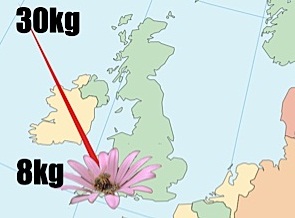The UK government appears to be buying into a biotech industry plan to mount a hard-sell greenwash campaign for GM crops. Commenting on Owen Paterson’s glowing endorsement for GM crops at the Oxford Farming Conference, Genewatch director Dr Helen Wallace told ARC that it was “…part of a big new PR drive.”
 Biotech is on the back foot in the US, she explained, adding that “…a lot of US farmers feel trapped.” As the reality of herbicide-resistant weeds and pests start to blight the industry’s American dream, Europe is the biotech industry’s next unplundered landscape.
Biotech is on the back foot in the US, she explained, adding that “…a lot of US farmers feel trapped.” As the reality of herbicide-resistant weeds and pests start to blight the industry’s American dream, Europe is the biotech industry’s next unplundered landscape.
In June 2012, the biotech-industry backed Agricultural Biotechnology Council (ABC) gathered at the Department for Business, Innovation & Skills (BIS) conference centre in London. The meeting was attended by senior parliamentarians, heads of civil service departments and prominent members of the UK’s research community. The conclusions from the meeting are as sweeping as they are alarming.
They point to a consensus around the room on a need for publicly-funded biotech research, as well as the entry: “Education: more focus on plants and biotech on the syllabus at all levels.” Another desired outcome reads: “Agreement between all relevant Government departments, as well as the devolved nations as to a more cohesive science framework, and the way to achieve this.”
The co-operation of devolved nations should not be assumed in Westminster, though. For years, SNP MEP Alyn Smith has been very uneasy about the basis of Europe’s existing GM authorisations and in 2011 he played a role in securing for Scotland the same rights as Member States to restrict and ban cultivation of GMO crops. At the time, he accused the Agriculture Committee of seeking: “…to use these measures as a Trojan horse for the entry of GM into Europe.”
There is also forthright opposition in Wales to the way assumptions made in London are foisted on the principality. Before Christmas, GMFree Cymru spokesman Dr Brian John took Sir Paul Nurse, President of the Royal Society, to task for playing second fiddle to the biotech marketing machine.
Dr John reminded the UK’s senior scientist of the necessary distinction between science and technology, adding that the biotech corporates: “.. are indubitably good at technology, but they have absolutely no understanding of scientific ethics and they have long histories of involvement in scientific fraud, bribery, the vilification of independent scientists, and other deeply unpleasant activities.” For all these reasons, John concludes that: “The public is deeply suspicious about GMOs, with good reason.”
For now, the biotech industry remains hell-bent on taking down whatever protection the EU ever afforded its 500 million citizens. So the what prevents Westminster from realising these corporate dreams on behalf of the biotech multinationals?
“Regulatory barriers and political divisions at national and EU level,” is top of the ABC list, ahead of the: “Lack of a joined-up strategy for biotech.” The latest charm offensive is a response to another perceived UK “barrier” for the corporate vision, namely: “The belief that the public are opposed to GM – only a vocal minority are.”
However the corporate vision has a more ominous perceived “barrier” in the context of the CAP: “The structure of agriculture, which is made up of a large number of small farms looking at different sectors, which makes commercialisation difficult.” In other words, the notion of diversity itself comes second to the commercial interests of biotech monoculture merchants.
Topping of the list of those attending the June meeting was David Willetts MP, minister of state for universities and science. This is a government function that is now attached to the department for Business, Innovation and Skills, where the meeting was being held.
Alongside Willetts was DEFRA parliamentary under secretary of state and GM research supporter Lord Taylor. The possibility of securing pillar II funding for biotech research excites the peer’s interest, coming as it does with half of any research budget supported by the European Union.
In addition to 10 senior members of the research community, the meeting was attended by Monsanto’s PR Lead – Europe and ABC’s deputy chair, Mark Buckingham. This retiring figure was caught on camera and interviewed while trying to slip away unnoticed from a Smith School day conference in 2011. The video above reveals some of the underlying corporate assumptions that Monsanto makes about Europe and the UK.
Buckingham describes the English as “emotional” about agriculture, hanging on to “rural culture [sic]”. The subsequent description of “artisanal” agriculture as a “valid niche” is a shameless show of corporate arrogance.






